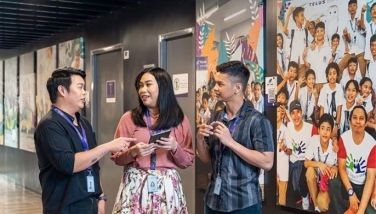Lost school days

Every year on average, 53 school days are lost due to weather disturbances, according to Education Secretary Sonny Angara. In the typhoon-hit Cordilleras alone, he said 35 days have already been lost so far this school year as of mid-November.
The Department of Education (DepEd) has jurisdiction over kindergarten to high school.
A similar count must be done by the Department of Social Welfare and Development (DSWD), which runs the community daycare or kiddie schools.
In my neck of the woods, classes are canceled not just during typhoons, but seemingly at the drop of a hat even in fine weather, at the DSWD-run kiddie school.
If this happened in private schools where tuition is not free, the school could face a lawsuit, or see an exodus of students.
The problem with our universal free education, from kiddie to tertiary level, is that the government thinks free can mean substandard, and the beneficiaries are in no position to complain.
But kiddie schools, for kids aged three to four, aren’t simply nurseries where working moms who can’t afford nannies park their toddlers. Kiddie schools are learning institutions.
A parent in the kiddie school was told that the classes were suspended regularly because teachers had to attend meetings or were tapped for non-teaching tasks such as keeping watch at evacuation centers.
If teachers in DSWD-run schools are also made to serve as welfare personnel, the kiddie schools must be taken out of the department and turned over to the DepEd.
* * *
Education and child psychology experts have long emphasized the importance of early childhood education, stressing that learning capacity is at its optimum in the early years.
Anyone who has seen children grow up knows how quickly the kids absorb everything, from multiple languages to basic mental, physical and motor skills. Folks belonging to Generation Alpha (those born from the start of the 21st century) in particular develop digital skills early. They are precocious and absorb sensory stimuli like a sponge.
It’s a shame to waste all that learning capacity because their school teachers are busy helping in ayuda distribution.
It wouldn’t be too bad if there really is a major emergency on the scale of Super Typhoon Yolanda or Kristine, requiring all hands on deck for relief and disaster mitigation. But what if the activities for which teachers are pulled out of their classrooms are merely for epal or credit-grabbing politicians’ fake philanthropy, especially with the 2025 campaign approaching?
Our neighbors such as Vietnam recognize the importance of early childhood learning in national development and competitiveness, and have invested heavily in this aspect of public education.
It has to be among the reasons why Vietnamese 15-year-old students ranked 13th in reading comprehension, 24th in math and fourth in science in the Program for International Student Assessment in 2018 wherein Filipinos languished at the bottom of the 79 participating states. (Vietnam, however, was not included in the official PISA rankings in 2018 because it took only the paper test and failed to switch to computer testing.) In 2022, when the Philippines placed 77th out of 81 in the PISA, Vietnam ranked 31st in math, 34th in reading comprehension and 37th in science.
Vietnam has now overtaken the Philippines in GDP per capita ($4,650 against our $4,150 this year, according to the International Monetary Fund). It is reportedly having problems accommodating so much incoming foreign direct investments, especially with businesses decamping from China – job-generating FDI that our country has been hard-pressed to attract.
After progressively sliding in most human development indicators behind the four other original founding members of the Association of Southeast Asian Nations (never mind the sixth member, Brunei, which is blessed with crude oil), we are now being left behind by Vietnam.
* * *
We should be in crisis mode when it comes to public education. Our political elite, unfortunately, benefits from keeping the masses poor, undereducated and left behind in the information age, dependent on patronage and fake philanthropy bankrolled by taxpayers.
The education crisis has no urgency for those who can afford to send their children to expensive schools overseas, or to the exclusive and also pricey private schools in the Philippines.
Underprivileged students aren’t the only ones suffering. Teachers have also long complained about being overworked and underpaid, with inadequate regular training and upskilling programs.
While politicians have control over billions in pork barrel and confidential funds, our teachers must beg for decent pay, scrounge around for gadgets that have become indispensable in modern education, endure poorly ventilated classrooms and make do with inadequate supplies of nearly everything. They often double as janitors, gardeners and guidance counselors.
Our teachers get paid the salary of house helpers overseas, so we shouldn’t be surprised that a number of them have opted to just work abroad as house help.
The government even takes pride in touting the number of Filipinos deployed overseas – a phenomenon driven by necessity due to the lack of better opportunities in this country.
Lacking education and skills, many of those workers take on jobs that citizens of the wealthy host countries eschew.
Substandard basic education affects all aspects of national life. It’s no coincidence that the world’s wealthiest and most competitive economies also offer top-quality education to their masses.
It’s little wonder that a country like South Korea, which puts a premium on education, has become a global soft superpower, while its neighbors can produce only copycats of BTS, Blackpink and period movies.
Children from underprivileged families are already at a disadvantage right at conception, with their mothers’ lack of nourishment making the kids vulnerable to physical and mental stunting.
The public school system at least has a supplemental feeding program for students from kiddie to sixth grade. The DSWD-run daycare / kiddie schools in our community give the students milk in cartons and sometimes instant cup noodles or arroz caldo.
Apart from supplemental feeding, the children need full mental nourishment and stimulation, starting with regular classes.
- Latest
- Trending






























